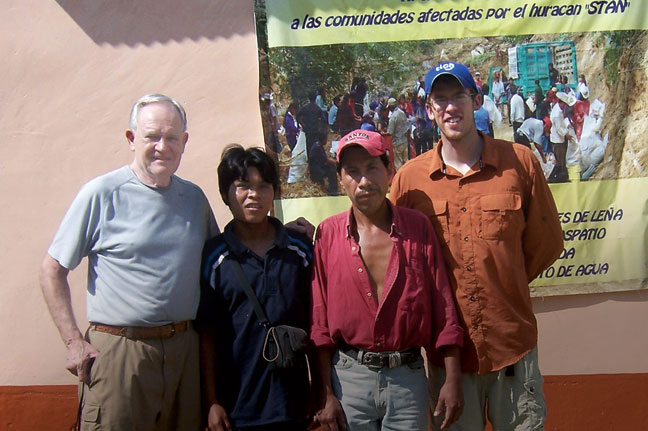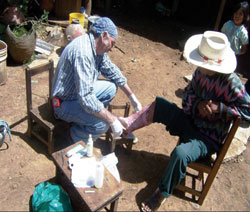Speaking of Sports: Un Amigo de San Cristobalby Brent Harris, Director of Sports Information |
| Printer-friendly version | Email this article |
|
"I had talked to [classmate] Adrian Mendoza, who was planning to work in Chiapas, Mexico, through a Dill Grant, and we came up with the idea of using my mathematics major to do some research for Amigos de San Cristobal," the senior Little Giant soccer and basketball star recalls. Amigos, a nongovernmental organization that David Orr ’57 and his wife, Nancy, helped establish four years ago, finds and develops funding for not-for-profit groups directly serving Chiapas’ most disadvantaged people.
"I thought I could work with their database, clean up some of the records, and keep up with my Spanish language skills," Simkus says.
In other words, a desk job.
But Orr and Chiapas had much more in store for Simkus.
At first all went as planned. Simkus settled into his Dill Internship at San Cristobal and began working for Amigos. From the hand- written notes and computer printouts that made up the donors’ lists of the various organizations Amigos funds, he created a searchable database in Excel that could easily sort through the volumes of information.
"[Wabash economics professor Bert] Barreto recommended books to read to help me create macros in the database, and he also helped answer questions I had as I put everything together," Simkus recalls. "I wanted to leave behind a ‘cheat sheet’ to answer any questions about the database once I left."
After Simkus completed the database and his "cheat sheet," the real work began.
Amigos needed him to make site visits to some of the projects the group supports to see firsthand how the donations were being used and to better understand the needs of the community they served.
Simkus was shocked by what he saw.
Hurricane Stan had ravaged Central America in October 2005, causing one of the worst natural disasters in Chiapas’ history. The calamity was barely covered by American news media. Cornfields, land cultivated in coffee, homes, and entire communities were lost as landslides raged down steep slopes in the highlands of the Sierre Madre. More than 12,000 people were suddenly homeless.
"Cancun was rebuilt in six months," Simkus says. "But here we were two years later and the government still hadn’t built bridges in the Chiapas area to allow proper transportation and supplies to reach these communities."
"Several months following the tragedy in the Sierra Madre, the government gradually abandoned needy victims," Orr explains, "except for weekly food drops to a couple of areas for families who found themselves isolated by new rivers created by the hurricane."
Such marginalization compounded by ineptitude continues to stoke long-standing distrust of and anger at the Mexican central government, a convergence Simkus witnessed.
"The government had put together food packages to deliver to one of the villages, but there were only 20 packages for almost 100 people," Simkus explains. "I saw photographs of people busting windows out of the helicopter when it landed to deliver the packages."
During his visit to the area, he was able to confirm the wiser and more compassionate approach taken by the groups Amigos supports.
"The [nongovernmental] programs Amigos supports always wait to deliver supplies until they have enough for everyone," Simkus says.
Simkus’ time with another organization that Amigos funds gave him the chance to walk alongside one of the most inspirational men he has ever met. Called "the saint of Chiapas" by some and "Deer Leg" by the Chamulan people, Don Sergio Castro has been going into the mountain villages around San Cristobal for 40 years. He provides free medical assistance, promotes good health practices, and now assists Amigos in building 25 schools in the area.
In many villages and rural areas of Chiapas, people have large wood fires inside their small one-room homes for cooking and heat. Pork is often undercooked on these fires, allowing the transmission of a parasite that affects the brain and can cause seizures. When the villagers have seizures, they may fall into the fire, suffering severe burns. Add to that toddlers and young children in such unsafe homes—and the fact that fireworks are a part of many religious rituals and festivals in the villages—and Castro can find himself treating dozens of severe burn cases at a time.
Amigos is funding a project to bring safer cooking stoves to the homes, as well as an effort to establish a free burn clinic in San Cristobal. In the meantime, the villagers have 70-year-old Castro, whose 40 years of experience yields uncanny success treating patients that would challenge top-flight burn units in the United States. With his medicine, often he’ll bring food for the family.
"Dr. Castro showed me five-year-olds who had been burned accidentally by boiling water. I met a man with Tourette’s syndrome who had an attack next to the fire and was burning for about 25 minutes," Simkus recalls. He had been scheduled to accompany Castro for one day, but was so inspired by his work that he joined him for a second outing.
"Here was a man who fell in love with the community he was serving and was doing everything he could to help," Simkus says. He left determined to help Castro—who tries to subsidize his hu-manitarian efforts with proceeds from his small museum in San Cristobal—to find more funding for his work.
Near the end of his stay, Simkus traveled to villages in the Sierre Madre near the Guatemalan border to work with members of Madre Tierre—a group of volunteers who train community representatives to perform medical treatment and educate inhabitants on improving sanitary conditions in their homes in 40 mountain communities. Sleeping at night on a concrete floor and reviewing by day Amigos programs, Simkus felt like a member of the community.
"Everyone would welcome me into the town and their homes," he says. "I listened to their stories and talked with them in these houses made out of material scavenged from the river.
"These people would work an entire day to earn the equivalent of $5 for their efforts. Five dollars didn’t seem like much to me before I met them; I couldn’t believe how important it was in the lives of these people."
One afternoon Simkus sat down with some of the villagers to teach them a new card game. When he asked one of them to shuffle the deck, he was stunned to discover they had never seen playing cards.
"Thanks to Gary, they learned in a hurry," Orr says. "They played cards for the next two hours that evening."
"The time I spent there was incredible," Simkus says. "They were interested in where I had been and what I had done. Everything was new to them. I got a chance to teach them new ideas."
When he returned from the Sierre Madre, Simkus began processing everything he had seen. He prepared a final report for Amigos.
Simkus’ evaluation of the program impressed Orr.
"Gary embraced this task wholeheartedly, taking a genuine interest in the needs of the people being served and befriending them with his relaxed approach and utilizing his good Spanish language skills," Orr says. "When it came time for the report to the board, Gary took the lead with his Amigos member partners in providing both the verbal and written reports, something I had not expected. It was an impressive demonstration of his initiative and his commitment to his work."
"I had a great time," Simkus says. "I got to see the country, learn about all the programs trying to support the people and communities of Chiapas, and got to see all the great work Mr. and Mrs. Orr and others are doing. I learned to listen to what people need and try to see what you can do to help meet those needs.
"Every time I listened to those stories I would think, I’m not the right person to be hearing this.
I don’t have the money or the resources to help. The only thing I can do right know is let others know what it’s like in Chiapas, so that those who do have the resources available can find a way to help."
And Simkus is doing exactly as promised.
"Shortly after the semester started, Gary emailed me to say that he had established a Web site on facebook.com for the purpose of generating donations to Amigos de San Cristobal," Orr says. "We have already seen the fruits of that initiative and are grateful to Gary for his many effo in support of our mission."*
Read more about Amigos de San Cristobal at www.amigosdesc.org
Photos: (top) David Orr and Gary Simkus with promotores in San Cristobal de las Cases; (bottom) Sergio Castro attends to a Chamulan's badly burned leg.
|

 When Gary Simkus ’08 applied for one of the College’s Dill Internship grants last summer, he knew exactly what he wanted to do.
When Gary Simkus ’08 applied for one of the College’s Dill Internship grants last summer, he knew exactly what he wanted to do. Castro was part teacher, part healer to the villagers. Not only would he check on the progress of the schools Amigos projects were funding, but he also would treat the many burn victims found in the area.
Castro was part teacher, part healer to the villagers. Not only would he check on the progress of the schools Amigos projects were funding, but he also would treat the many burn victims found in the area.